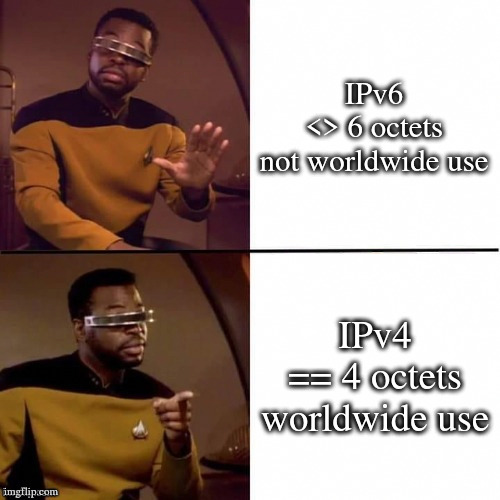this post was submitted on 19 Jun 2024
209 points (100.0% liked)
Programmer Humor
421 readers
1 users here now
Welcome to Programmer Humor!
This is a place where you can post jokes, memes, humor, etc. related to programming!
For sharing awful code theres also Programming Horror.
Rules
- Keep content in english
- No advertisements
- Posts must be related to programming or programmer topics
founded 2 years ago
MODERATORS
you are viewing a single comment's thread
view the rest of the comments
view the rest of the comments

It should only be needed if your ISP is brain-dead and only gives you a /64 instead of what they should be doing and also giving you a /56 or /48 with prefix delegation (I.e it should be getting both a 64 for the wan interface, and a delegation for routing)
You router should be using that prefix and sticking just a /64 on the lan interface which it advertises appropriately (and you can route the others as you please)
Internal ipv6 should be using site-local ipv6, and if they have internet access they would have both addresses.
My ISP does this right (provides a /56 for routing), but unfortunately both are dynamic and change periodically. Every time I disconnect and reconnect from the internet, I get a different prefix.
I ended up needing to have ULAs for devices where I need to know the IPv6 address on my network (e.g. my internal DNS servers).
Indeed, that's correct ula usage, but shouldn't need nat rewriting. The global prefixes just need to be advertised by RA packets
I use openwrt on my home network which uses dnsmasq for dhcp. It can give a static suffix which just works with the global prefix on the interface and the site local / ula prefix it uses
Note that Android doesn't support DHCPv6, just in case you have Android devices and ever have to debug IPv6 on them.
Yup indeed. That's why it advertises both dhcp and slaac